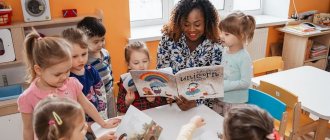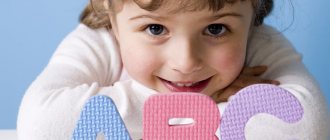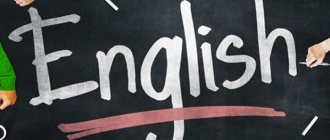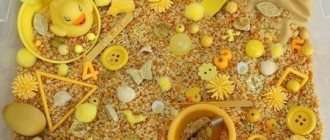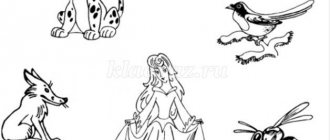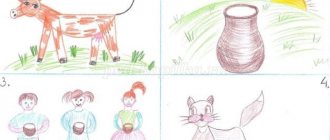Small family #1
Feel free to listen to the pronunciation many times and repeat it loud and clear - this is how you will remember the words best!
| Mother | Mother |
| Father | Father |
| Sister | Sister |
| Brother | Brother |
Practice and memorize this little rhyme!
| Mother, father, sister, brother. Hand in hand with one another! | Mom, dad, sister, brother, Hand in hand with each other! |
Mother's words
and
father
are considered formal, they are suitable for talking about relatives, but in everyday life we use more affectionate colloquial options, and for everyday communication we will need the word
me
- I:
| Mummy | Mother |
| Daddy | Dad |
| Me | I |
Topic(s) of the lesson
| Lexical units | Speech structures | Grammar | Sounds |
| My family | mother*, father*, sister*, brother*,baby*, grandmother*, grandfather*,dance*, jump* | This is the (Mother) who (puts us to bed). | count to fourteen; complex sentence with the pronoun who |
In this lesson children will learn:
- 1) count in English to fourteen;
- 2) name family members in English;
- 3) use the pronoun who in a complex sentence.
You will need: 1) doll dog Spot; 2) panel “My Family” (in the form of an applique - a house with multi-colored (red, orange, yellow, green, blue, purple) windows that open, in each window there is a family member (mother, father, grandmother, grandfather, brother, sister, baby, dog Spot in the window or in the kennel) or just a large drawing on cardboard - a family portrait with Spot; 3) a doll (or a picture with its image), a ball (or picture), a picture with a picture of bread, a small crib ( or a picture of a crib), rattle.
Teacher: Hello, everybody! Good to see you again. Let's begin our English lesson. Today we'll learn how to count to fourteen. Today we will learn to count to fourteen. Now close your eyes.
Children close their eyes and count in English to fourteen.
Spot appears. Greets children (Dialogues alternate: 1) Hi, Serezha, – Hello, Spot. – How are you? - I am fine. And you? – I'm very well. 2) Hello, Olya, good to see you! – Hi, Spot, good to see you, too. 3) Hello, are you Sveta? – No, (I am not). – Are you Ksusha? – Yes, (I am). – Good morning, Ksusha! – Good morning, Spot!).
The kids say hello to Spot.
Teacher (takes out a panel): Guys, Spot asked me to let him play with you. He sometimes wants to deliberately say things wrong so that you can guess what he said wrong. If he says everything correctly, you answer him Yes, it is. Well, if it’s wrong, say No, it isn’t. And tell me how to speak correctly. Shall we try?
Spot (pointing to mom): This is the Father.
Children: No, it isn't. This is the Mother.
Spot (pointing to brother): This is the Sister.
Children: Yes, it is. etc.
Teacher: Very good.
Spot mutters a poem:
This is the Father who brings us our bread This is the Mother who puts us to bed This is the Brother who plays with his ball This is the Sister who plays with her doll And this is the baby – the smallest of all.
Teacher: Spot, what are you muttering there?
Spot: It's a rhyme. We learned it in the kindergarten in England.
Teacher: Spot says he's reciting a rhyme they learned in kindergarten in England. Spot, like you, goes to kindergarten, only this is a kindergarten for dogs! There they learn poetry in English. Well, Spot, tell us this rhyme, please.
Spot is shy, lowers his head, turns away.
Teacher: Spot seemed embarrassed. Let's ask him to tell us this poem. It’s interesting what poems English dogs learn. We need to say Spot, please, tell us the rhyme!
Children: Spot, please, tell us the rhyme!
Spot: OK, I will. (Recounts a poem.)
Teacher: Guys, have you guessed who Spot’s poem is about? That's right, about dad, mom, brother, sister and baby.
Spot whispers something in the teacher's ear.
Teacher: Guys, Spot will tell us a poem, he just asks you to help him. Here we have bread, in English – “bread” (shows a picture), here is a crib, in English – “bed”, here is a ball, in English – “ball”, and here is a doll, in English "doll". I'll give some of these things to some guys. Serezha, take the bread, you'll be the father. Sveta, take the bed, you'll be the mother. Danila, take the ball, you'll be the brother. Olya, take the doll, you'll be the sister. Nadya, you'll be the baby. Here is the rattle for you. Seryozha will be our father, the father. Sveta will be a mother, the mother. Danila will be a brother, the brother. Olya - sister, the sister. And Nadya will be a baby, the baby.
The teacher gives the children pictures of bread, a crib, a ball, a doll and a rattle. Children sit in a circle on chairs. Spot recites the poem at a slow pace.
THIS IS THE FATHER
This is the Father who brings us our …bread.
(The child who has a picture of bread picks up the picture.) This is the Mother who puts us to... bed. (The child who has a picture of a crib picks up the picture.) This is the Brother who plays with his ... ball. (The child who has a picture of a crib picks up the picture.) This is the Sister who plays with her ... doll. (The child who has the ball picks up the picture.)
And this is the baby – the smallest of all.
(The child who has the rattle rings the rattle.)
Teacher: Well done, kids! Well done boys! I see that Spot liked your performance. Let's now let the other guys be mom, dad, brother, sister and baby (The dramatization is played out again with the participation of other children. When re-enacting, the children begin to gradually reproduce the poem themselves. If there are a lot of children, you can distribute the same pictures to some of the kids from the very beginning.)
Teacher: Good. Now, children, do you want to play? Let's play. Stand in a circle. Make a circle big and round. Now we will listen to a song about family members and pass a ball around. Listen carefully, there will be the words I see you! (I see you!) Whoever has a ball on the word you goes to the middle of the circle. He must spin around if the song says dance, dance, or jump if the song says jump, jump, or pretend to cry (at the end of the song you will hear the baby crying), then he returns to his place. We continue passing the ball until the song ends.
Father, Father, Father, Father Father, I see you!
(The child who got the ball goes into the circle.)
Mother, Mother, Mother, Mother Mother, I see you!
(The second child who got the ball also goes into the circle.)
Father, lets dance, dance! Mother, lets dance, dance!
(Two children who come out into the circle spin around, then return to their places.)
Brother, Brother, Brother, Brother Brother, I see you!
(The child who got the ball goes into the circle.)
Sister, Sister, Sister, Sister Sister, I see you!
(The child who got the ball goes into the circle.)
Brother, let's jump, jump! Sister, let's jump, jump!
(Two children who come out into the circle jump, then take their places.)
Baby, Baby, Baby, Baby Baby, I see you!
(The child who got the ball goes into the circle.)
Father, Mother, Sister, Brother Father, Mother, Sister, Brother Father, Mother, Sister, Brother (waaaa!)
(A child who comes into the circle imitates a crying baby, then takes his place.) Baby, I see you!
(The child who got the ball gives it to the teacher.)
In your notebooks, draw or glue a doll, a ball, bread and a crib; you now know these words in English. Now it's time to say good-bye. Good-bye, children! See you!
Flashcards and workbook
We recommend dividing words from the topic “Family” into two lessons. If you have the opportunity, print out cards and workbooks, you can work with them in any way, the more fun and dynamic, the better
